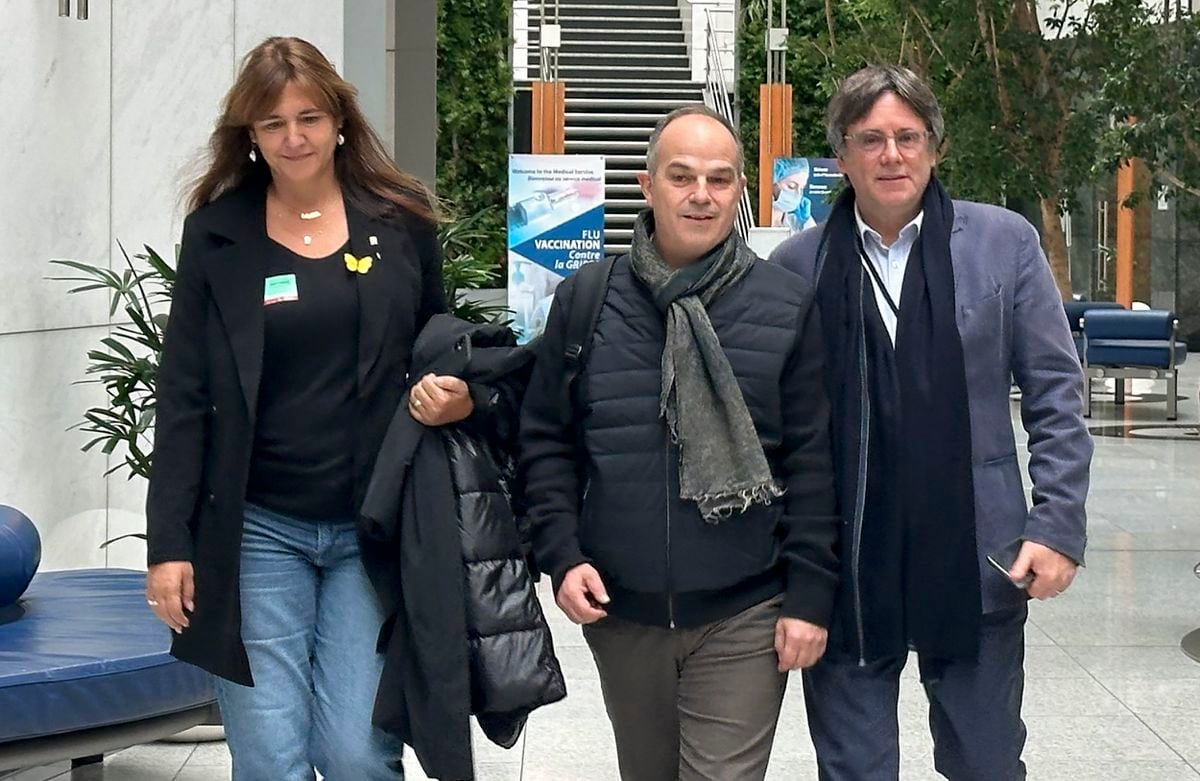The former president of the Generalitat Carles Puigdemont (on the right), together with the president of Junts, Laura Borràs, and the general secretary of the party, Jordi Turull, in the European Parliament, on December 9. Dani Rovirosa (EFE)
The deadline to negotiate an agreement to unblock the amnesty law passes and Junts per Catalunya is screwed in the rejection that, ten days ago, caused the text to stall in the Congress of Deputies.
The strategy involves supporting the idea that only Junts is the one who will ensure the closure of all judicial cases derived from the
process
.
A double or nothing bet.
Extract a new concession from the PSOE and raise the figure of Carles Puigdemont among the independence movement with four months to go before the European elections, or explore the void that overturning the amnesty implies.
The collateral effect is that the conversations with the socialists become tense and the uncertainty and internal noise within Junts grows.
In June, Puigdemont risks revalidating his MEP seat.
He has not made the candidacy official, but in his environment it is assumed that he will head the list.
Since Waterloo, the theory has been proclaimed that, for now, it is the PSOE that has much more to lose if the amnesty derails.
“The
president
says that if he presses the button, the Government will fall,” reveals a Puigdemont collaborator, alluding to the approach used by the former Catalan president to vindicate the role of force that Junts has to support the legislature.
The premise of Puigdemont's team is that “there is still time” to negotiate an amnesty law that can satisfy all parties.
The PSOE replies that, beyond technical issues, there is no room to touch on substantive issues.
Junts tries to strengthen the story that presents him as a negotiator unrelated to personal interests to emerge victorious from the comparison with Esquerra Republicana and from the treatment that the Republicans obtained last term with the pardons of the politicians who organized the illegal referendum of 1 -EITHER.
A “comprehensive amnesty” to counteract what, according to Junts spokesperson Josep Rius, were “pardons for VIPs.”
“Puigdemont does not want to be an Oriol Junqueras, this is an idea that he carries deep inside,” a person close to the former Catalan president tries to summarize.
From Belgium, where he left in 2017 to avoid being tried, Puigdemont controls the timing of the negotiation between Miriam Nogueras, JxCat spokesperson in Madrid, with the PSOE.
And she trusts the criteria of his lawyer, Gonzalo Boye, with the details that the amnesty law would have to contain to have the seven crucial votes of Junts.
“I'm not worried at all.
Absolutely.
There is no one who has a more armored defense than Mr. Puigdemont.
I am concerned about the other seventy investigated,” Boye said this week on RAC1.
The message alludes to the possibility that the former president could end up accused of terrorism due to his relationship with the Tsunami Democràtic cause, a type of crime that would make it difficult to apply the amnesty.
Boye's indifference reinforces the idea that Junts does not negotiate with an eye on Puigdemont's interests, but rather pursues a deal with transversal benefits.
The president of Junts, Laura Borràs, has stated that the party prefers “the risk of unconstitutionality” rather than “abandoning people” and leaving them outside the protection of the law.
The rivalry between Puigdemont and Junqueras is fierce, but ERC affirms that it does not intend to use the amnesty as a political battle weapon.
“If Junts is looking for a way to land and be able to vote yes, Esquerra will provide the gateway,” indicates a source from the Republican party.
The Superior Court of Justice of Catalonia has set for next April the date for holding the trial of three senior officials of Esquerra related to 1-O.
Josep Maria Jové and Lluís Salvadó are accused of the crimes of disobedience, prevarication and embezzlement, and the Minister of Culture Natàlia Garriga is prosecuted for serious disobedience to authority.
“We need the amnesty law, and there is no debate between good law or bad law.
The problem is not the text, it is the judges,” they say in Esquerra.
Sources from the party that rules the Generalitat recognize contacts with Junts to try to bring positions closer to the socialists.
“The PSOE does not need any amnesty law, the investiture has already been done,” they point out in ERC.
The leader of Junts tightens the rope of dialogue with the socialists but is careful not to tear it apart.
This Thursday he made public a letter, supposedly sent to all the deputies of the European Parliament, where he directly accuses the PP of having invented a speech to tarnish his image and his reputation.
“If my party had allowed the investiture of the PP candidate, Alberto Núñez Feijóo, or had prevented that of Pedro Sánchez, all these spectacles would not have occurred.”
Coinciding with the decision of the European Parliament, which asks to investigate the links of the Catalan independence movement with Russia and the interference in the
process
, the former Catalan president emphasizes that the PP “has managed to impose its standards on the European conservative majority, and it is disastrous news for the future of the Union.”
The letter denounces that former president José María Aznar is the ideologue of the persecution strategy promoted by the “judicial, economic and media right” and maintains that “the construction of the case on what is known as the Russian process of the process
is
similar to the construction of "the conspiracy theory in the 11-M attacks in Madrid."
Subscribe to continue reading
Read without limits
Keep reading
I am already a subscriber
_

